
In March of 1990, five University of Kansas law students formed the Kansas Journal of Law & Public Policy, a new legal publication at the School of Law, to meet two goals.
The first goal was, and remains, to prompt policymakers and scholars to address policy issues left unaddressed – or inadequately addressed – in traditional legal scholarship publications. The Journal defines "public policy" as the impact of legal rules on society, and through this definition seeks to provide a forum for the discussion of public policy issues.
The second goal remains to foster a broad notion of diversity in these public policy debates. The Journal endeavors to provide both important information to policymakers and diverse treatments and critical analysis of the same. The Journal aspires to create a forum open to all those offering viewpoints on and solutions to public policy problems and issues. To this end, the Journal's Editorial Board remains neither conservative nor liberal, but instead is interested in presenting thought-provoking, informative and interesting viewpoints.
The Journal was conceived as a tool for exploring how the law shapes public policy choices and how public policy choices shape the law. The Journal seeks to reach a broad audience. It is the mission of the Journal to reach decision-makers at all levels – legislators who create the laws, judges who interpret the laws, educators who influence thinking about the laws, and voters who influence the entire process.
Founding Members: Rita Bigras, Louis Cohn, Scott Long, Paulette Manville and David Summers
Carly Cook
Samantha Crawford
Nathan Isom
Peyton Schow
Sarah Smoot
Neelie Browne
Corrinne Yoder-Mulkey
Hunter Bach
Carson Cargill
Noel Cory
Erin Downey
Hayley Engelland
Keegun Gose
Allison Haggerty
Mason Hernandez
Rachel Holt
Charlie Ketchum
Michael Maffry
Kamryn Nickel
Will Orlowski
Abby Ottaway
Matthew Price
Theodore Spitz
Thomas Ward
The Journal invites well-written articles on current issues that advocate well-reasoned public policy arguments. However, the public policy argument must be central and clear. It is the express policy of the Editorial Board “to publish good articles, regardless of the source.”
The Journal's mission is to enable diversity in dialogue on important public policy issues. Submissions are encouraged from all disciplines, and all viewpoints are welcomed. Furthermore, the Journal encourages timely responses to articles it publishes, thereby furthering both public policy debate and the Journal’s goal of presenting a bona fide dialogue.
Authors who submit articles should provide the Journal with a typed, double-spaced manuscript. Authors who elect to mail their manuscripts should also provide the same in electronic form (e.g., by enclosing readable CDs or by concurrent submission via the internet). The Journal requests format in Microsoft Word only. The Journal uses footnote formatting in its publication. The author’s citations should conform to the most recent edition of "A Uniform System of Citation."
Kansas Journal of Law & Public Policy
University of Kansas School of Law
Green Hall, 1535 W. 15th Street
Lawrence, KS 66045
Phone: 785-864-3333 (message service)
Fax: 785-864-5054 (with cover sheet marked "Kansas Journal")
Email: kujlpp@gmail.com (with subject line "Attn: Managing Editor”)
The views, opinions and conclusions expressed herein and within the Journal itself are those of the authors and do not necessarily reflect those held by the Journal, the Journal's editors and staff, or the University of Kansas School of Law.
To request a subscription to the Kansas Journal of Law & Public Policy, contact us at:
The Kansas Journal of Law & Public Policy
University of Kansas School of Law
Green Hall, 1535 W. 15th Street
Lawrence, KS 66045
Phone: 785-864-3333 (message service)
Fax: 785-864-5054 (with cover sheet marked "Kansas Journal")
Email: kujlpp@gmail.com (with subject line "Attn: Business Manager")
Visit the Kansas Journal of Law and Public Policy's website to read articles from the current volume and from past issues.
The Kansas Journal of Law and Public Policy launched an online supplement, the Kansas Journal of Law and Public Policy Online, in 2020. The Journal Online features high-caliber, short pieces focused on timely public policy issues, serving as a supplement to the Journal‘s print publication.


Friday, February 23, 2024
9 a.m. - 4 p.m.
8 - 9 a.m. Check-in and breakfast
In-person event | Rms 106 & 203, Green Hall
This year's symposium examines how legal and museum professionals work to navigate the complex issues found in the field of art law. The program will discuss restitution and repatriation, trade of cultural property and the ethical stewardship of objects in museums. The symposium will host academics, legal scholars and museum professionals for discussions rooted in the public policy considerations of art law issues.
No CLE was offered during the symposium
Speakers included:
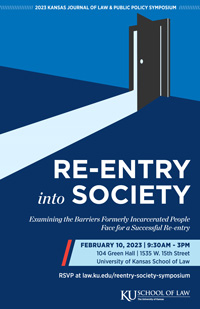
Friday, February 10, 2023
9:30 a.m. - 3 p.m.
In-person event | 104 Green Hall
The United States continues to have one of the highest recidivism rates in the world. This year's symposium addresses the challenges formerly incarcerated people face in re-entering society. The program examines current issues surrounding housing access, employment, fines/fees, and financial marginalization. The symposium will host academics, legal scholars, and re-entry court graduates to provide ideas on how to reform the current system.
No CLE was offered during the symposium
Speakers included:
Friday, February 11, 2022
9 a.m. - 1 p.m. CST
Virtual event
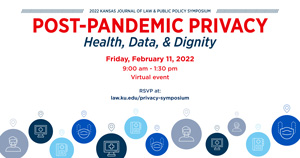
This year’s virtual symposium focused on post-pandemic privacy implications concerning health care, technology and cybersecurity, and included two panels and a roundtable discussion. The event was co-hosted by the Kansas Journal of Law & Public Policy and PrivacyPraxis.
Panel One’s focus is on the post-pandemic reshaping of the health care system and issues regarding telehealth, technology and social disparities. Panel Two’s focus is on post-pandemic technology concerns regarding security, surveillance, biometric and location data, and other technology-related privacy implications. During a roundtable discussion, panelists will discuss the disproportionate impact of the pandemic in racially marginalized communities.
No CLE credit was offered during the symposium.
Panel Three/Roundtable Discussion:
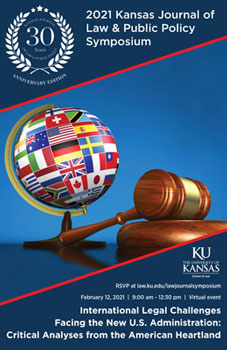 2021 Kansas Journal of Law & Public Policy Symposium
2021 Kansas Journal of Law & Public Policy SymposiumFebruary 12, 2021
9:00 a.m. - 12:30 p.m. CST
Virtual event
The 2021 Kansas Journal of Law & Public Policy Symposium advanced contemporary discourse and provide a timely forum after the 2020 U.S. presidential election and President Biden’s inauguration. The symposium hosted legal scholars from around the world who will discuss the international legal challenges facing the new U.S. administration and how these changes impact the legal landscape.
No CLE credit was offered for this program.
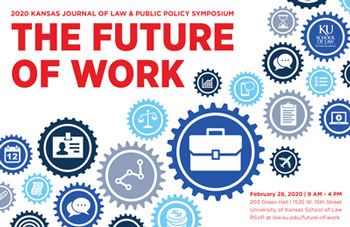 2020 Kansas Journal of Law & Public Policy Symposium
2020 Kansas Journal of Law & Public Policy SymposiumFebruary 28, 2020
9:00 a.m. - 4:00 p.m.
203 Green Hall
Lawrence, Kansas
The 2020 Kansas Journal of Law & Public Policy Symposium explored perspectives around the future of work and what that means for employees, employers and lawyers. The morning session focused on changes for employees and employers, while the afternoon session will focus on changes in the practice of law and what that means for today’s attorneys. The symposium hosted academics practitioners and legal scholars from around the country who discussed the ever-changing work environment and how these changes impact the legal landscape.
No CLE credit was offered for this program.
“The Future of Work” symposium is sponsored by the Shook, Hardy & Bacon Center for Excellence in Advocacy at the University of Kansas School of Law.
Ngozi Okidegbe holds the Harold A. Stevens Visiting Assistant Professorship at the Yeshiva University Cardozo School of Law. While in law school, she clerked for then-Attorney General of Nigeria, Bello Adoke, where she researched barriers to the legal redress of HIV discrimination. Following law school, she clerked for Justice Madlanga of the Constitutional Court of South Africa and for the Justices of the Court of Appeal for Ontario. She also practiced at CaleyWray, a labor law boutique in Toronto.
Okidegbe graduated with an Honors B.A. with distinction from Concordia University in Montreal and with a B.C.L./L.L.B. from McGill University's Faculty of Law, where she was awarded the Edwin Botsford Busteed Scholarship, the Rosa B. Gualtieri Prize, the Daniel Mettarlin Memorial Scholarship, and the Schull Yang Award. She subsequently earned an LL.M. from Columbia Law School, where she graduated as a James Kent Scholar.
Okidegbe's research interests include criminal procedure, evidence, critical race theory. Her research explores how race and ideas about race impact procedural and evidentiary outcomes in the criminal justice system. Her most recent scholarship problematizes the admission of defendant-authored rap lyrics as evidence in Canadian criminal cases and was published in the Criminal Law Quarterly in 2018.
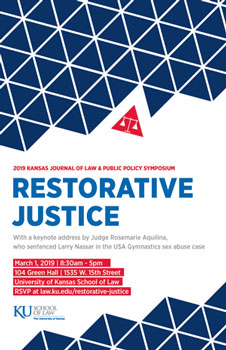 2019 Kansas Journal of Law & Public Policy Symposium
2019 Kansas Journal of Law & Public Policy SymposiumWith a keynote address by Judge Rosemarie Aquilina, who sentenced Larry Nassar in the USA Gymnastics sex abuse case
March 1, 2019
8:30 a.m. - 5 p.m.
104 Green Hall
The 2019 Law Journal Symposium explored the theoretical underpinnings of restorative justice principles and demonstrate how these theories are applied in different areas of the law. The program began with a look at how restorative justice was used by Judge Rosemarie Aquilina in the Larry Nassar sentencing hearings, a proceeding that received nationwide attention. Following the discussion of the Nassar trial, scholars from across the nation discussed differing theories of restorative justice and its application in their respective fields.
No CLE credit was offered for this program.
A special thanks to KU Women in Law for their support and assistance with the 2019 Law Journal Symposium.
Judge Aquilina earned her Juris Doctorate degree from Thomas M. Cooley Law School in 1984 and her Bachelor of Arts Degree from Michigan State University in 1979. Judge Rosemarie Aquilina was elected to the 30th Circuit Court for Ingham County in November of 2008. Previously, she served as a 55th District Court Judge for 4 years, during which time she served as Chief Judge as well as the Sobriety Court Judge.
Judge Aquilina retired Honorably from the Michigan Army National Guard after twenty years of service. She became part of Michigan’s history by becoming the first female JAG Officer in the Michigan Army National Guard when she enlisted. Ultimately, she became one of the most requested JAG Officers because of her dedication to service and the soldiers she served with.
Judge Aquilina is an adjunct professor at Thomas M. Cooley Law School where she enjoys teaching classes to include Family Law, Advanced Trial Practice-Family Law, Legislative Process, Defending Battered Women, Animal Law, Child Abuse and Neglect, Elder Law, and Military Law. Cooley Law School awarded Judge Aquilina the distinguished Griffen Award for Teaching Excellence. She is also an adjunct professor at Michigan State University School of Law teaching numerous classes in the Feiger Trial Practice Institute to include Criminal Trial Practice, Civil Trial Practice, Trial Practicum, Criminal Law and Criminal Procedure in the JD and LLM programs. Michigan State University honored Judge Aquilina with the College of Law Student Bar Association Adjunct Faculty Award for exceptional teaching.
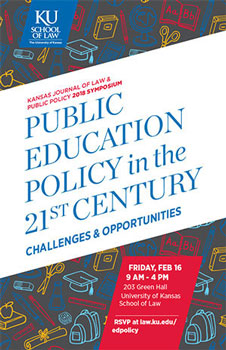 2018 Kansas Journal of Law & Public Policy Symposium
2018 Kansas Journal of Law & Public Policy SymposiumFebruary 16, 2018
9 a.m. - 4 p.m.
203 Green Hall
The 2018 Kansas Journal of Law & Public Policy Symposium addressed the role and importance of public education, culturally and economically, through the lens of law and policy. The program explored Kansas' current challenges with public school financing, as well as national trends and recent policy changes. Academics, legal scholars and practitioners will discuss pressing issues and provide ideas for the future.
The symposium was divided into two sections: School Financing and Litigation, and Issues in Public Education (including discussion on closing the achievement gap, charter schools, and public education for refugees).
No CLE credit was offered for this program.
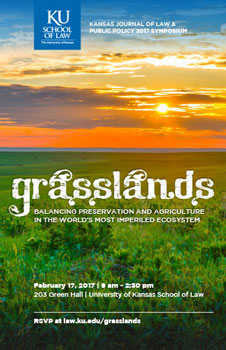 2017 Kansas Journal of Law & Public Policy Symposium
2017 Kansas Journal of Law & Public Policy SymposiumFebruary 17, 2017
9 a.m. - 2:30 p.m.
203 Green Hall
The 2017 Kansas Journal of Law & Public Policy Symposium addressed the importance of grassland preservation ecologically, socially and economically through the lens of law and policy. Speakers from across the nation focused on grassland preservation not only in Kansas and the Midwest, but also worldwide.
No CLE credit will be offered for this program.